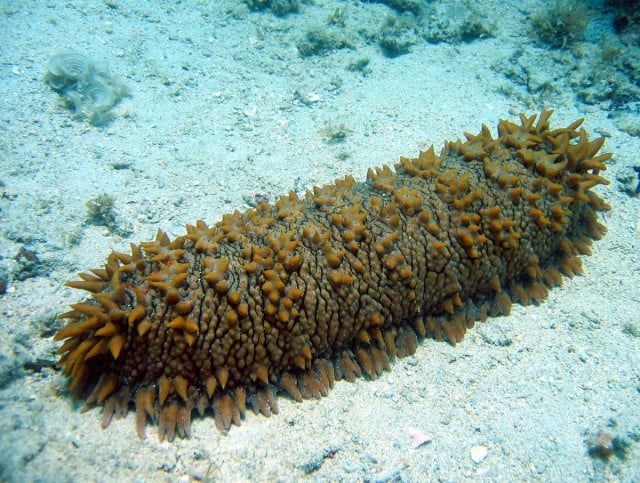
It may not be on the menu of a restaurant near you but the ‘luxury seafood’ status of the humble sea cucumber in many parts of the world is pushing the creature to the edge of extinction.
Sea cucumbers are under greatest risk in regions with poor economies and high human populations – but even those species found on Australia’s Great Barrier Reef are under threat, according to a new study led by Southern Cross University.
The findings are outlined in the paper The cost of being valuable: predictors of extinction risk in marine invertebrates exploited as luxury seafood published this week in the journal Proceedings of the Royal Society B.
‘Corals are not the only thing under grave threat on Australia’s Great Barrier Reef. The study highlights that certain sea cucumbers are also at risk due to commercial fishing for export,’ said lead author Dr Steven Purcell.
Dr Purcell is a Senior Research Fellow at the University’s National Marine Science Centre, who works out of New Caledonia in the southwest Pacific.
He said 16 sea cucumber species were classified as threatened with extinction on the latest IUCN (International Union for Conservation of Nature) Red List.
Nine of the 16 species now classified on the IUCN Red List as Vulnerable or Endangered are found on the Great Barrier Reef.
‘Most of those are currently, or have recently been, exploited. While I cannot say that the populations on the Great Barrier Reef are at immediate risk of extinction, the species are certainly at grave risk on a broader geographic scale, particularly in low-income developing countries where fishing pressure is high and management insufficient,’ said Dr Purcell.
‘Within Australia there should be greater investment into independent research to understand population numbers and effects of fishing on our own reefs if we are to safeguard these creatures for ecosystem functions and harvest opportunities for future generations.’
In Australia, threatened sea cucumber species are fished within the Great Barrier Reef Marine Park, the Coral Sea, the Torres Strait, the Northern Territory and the top end of Western Australia.
‘A study published last year showed evidence that high-value sea cucumber species have been serially exploited by commercial fishing on the Great Barrier Reef, attributed in part to unresponsive management and little baseline data on their population sizes. That study comes off the back of other recent research indicating that the feeding process of sea cucumbers may provide some help to buffer corals and other reef organisms from the effects of lowering pH of seawater due to elevated carbon dioxide in the atmosphere,’ Dr Purcell said.
Sea cucumbers have been severely over-exploited in fisheries in the Pacific, south-east Asia and the Indian Ocean.
‘As one of the wealthiest nations with tropical sea cucumbers, Australia has the financial and technical resources to be setting a better example of responsible fisheries management,’ Dr Purcell said.
The study’s authors analysed the relationships between biological and anthropogenic variables and the extinction-risk classifications of sea cucumbers, harvested for Asian luxury seafood markets.
‘High market value related strongly to their risk of extinction. Species in regions with high human population density and poor economies were at greater risk, so conservation is a sociological issue,’ Dr Purcell said.
‘We are calling for greater research on invertebrates, which dominate the earth’s marine biodiversity. We must be watchful of valuable species and support low-income countries to implement trade restrictions of threatened species.’




I’ve never seen sea cucumber on a menu. We need to save these endangered species. I heard that 200 species go extinct every day. That can’t be good for the future.